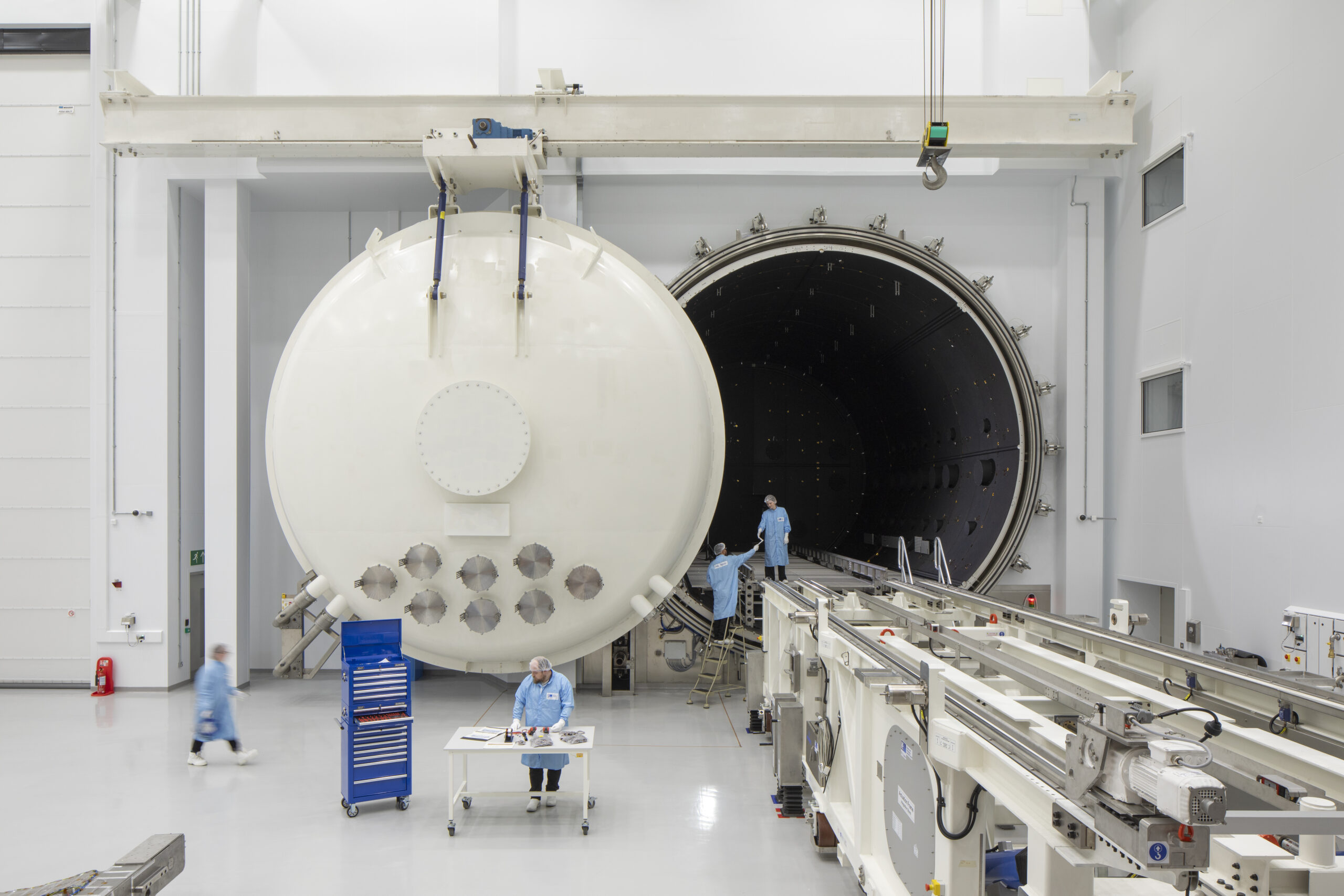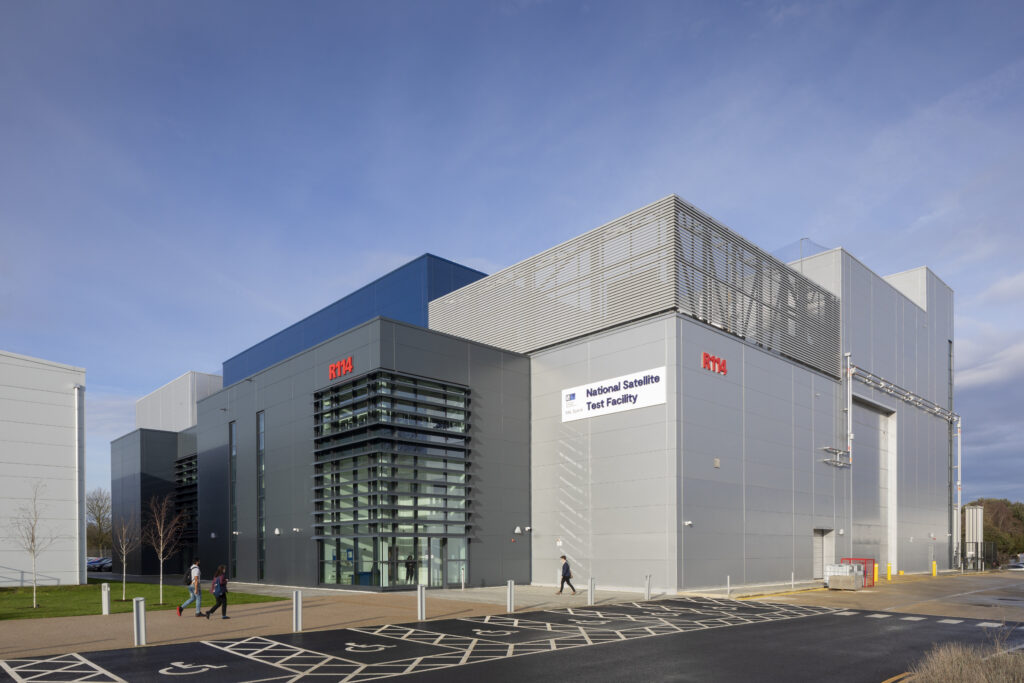
Lift off for new UK National Satellite Test Facility
The UK’s first “one-stop shop” for large satellite testing has been officially opened and is set to welcome its first customers.
The National Satellite Test Facility (NSTF) at Harwell Campus and operated by the Science and Technology Facilities Council (STFC) RAL Space is set to ensure that spacecraft up to seven tonnes will survive launch and the harsh conditions of space. Mini-bus sized satellites will be shaken violently to simulate rocket launch conditions, and “baked” in the UK’s largest space test chamber to check their resilience to the extreme temperatures they will face in Earth’s orbit and further afield.
The facility was officially opened at a ceremony attended by STFC Executive Chair, Professor Mark Thomson, Director of RAL Space, Dr Sarah Beardsley, and UK Space Agency CEO, Dr Paul Bate as well as representatives from leading companies in the UK space sector. To mark the opening of the facility, the UK Space Agency has been announced as the latest customer to sign a contract to use the NSTF for testing of the European Space Agency’s (ESA) Ariel payload. The UK is already playing an important role in this upcoming astronomy mission, which will study the chemistry of around 1000 planets outside our solar system, with RAL Space leading the international payload consortium and the mission science led by University College London (UCL).
As well as helping to further our understanding of the Universe, the NSTF will support science and security missions closer to home. Contracts have already been signed to test ESA’s FLEX Earth observation satellite on behalf of Thales Alenia Space, and with Airbus Defence and Space which will conduct the first tests at the NSTF later this year for SKYNET 6A, the latest satellite in the UK Ministry of Defence’s secure communication programme.

Based in the heart of Harwell’s Space Cluster, with over 100 local and international space organisations, the NSTF is a more than £100 million UK investment that will strengthen the UK’s position as a world-leading satellite manufacturer and help deliver the National Space Strategy.
This is the first time that the UK will have a comprehensive set of large scale space test facilities all under one roof. This includes a dynamics suite, where satellites will be shaken and exposed to levels of sound replicating that of a rocket launch, and a 7m-diameter space test chamber to simulate the vacuum and temperature conditions of space. The NSTF also features an impressive electromagnetic compatibility and antenna test chamber where satellites’ communications systems can be tested securely.
RAL Space has decades of experience operating similar tests in its existing facilities, which include a range of vacuum chambers up to 5m in diameter and a smaller-scale vibration facility. However, the NSTF has extended RAL Space’s capabilities and its team of experts, having already led directly to 30 new jobs in the Oxfordshire area including several apprenticeship and graduate opportunities.

The National Satellite test Facility vacuum chamber is a sealed room inside the facility which is capable of simulating the vacuum and temperature conditions of space. Vacuum chambers are the closest thing to testing the satellite in outer space and this particular chamber can reach temperatures as low as or as -180oC or as high as +130oC | © The Science and Technology Facilities Council (STFC)
Andrew Griffith MP, Minister for Space at the Department for Science, Innovation and Technology, said:
“The opening of the new National Satellite Test Facility is a significant milestone for the UK’s growing space sector that will offer the tools necessary to innovate for years to come in a competitive global market. By simulating the tough conditions of launch and orbit through rigorous testing, it will increase the resilience of our satellite technology to drive forward advances in navigation, weather forecasting and more – positioning our sector at the forefront of pioneering new space technologies.”
Professor Mark Thomson, Executive Chair of STFC, said:
“UK satellite manufacturers will now have a state-of-the-art one-stop test facility on their doorstep with the capability to test very large satellites. The NSTF will also enable the UK to support major international efforts in fields including space exploration and Earth observation. Cutting-edge facilities around the globe, such as the NSTF, are what enable the international space community to accelerate the development of next generation of space technologies and large-scale scientific missions. STFC is proud to support this world-leading UK facility that will provide a major new sovereign space capability, which will contribute to our national goals for space as set out in the National Space Strategy.”
Dr Sarah Beardsley, Director of RAL Space, said:
“I’m delighted that the National Satellite Test Facility is open for business. This is a huge achievement not just for RAL Space, but for the wider UK space sector. It’s taken a lot of collaborative effort to get to this point, but the exciting part – using this facility to support the delivery of the National Space Strategy and prepare large-scale satellites for their various missions in space – is only just about to begin. I’m very proud that RAL Space’s heritage and expertise in space science, technology development and testing is recognised in this flagship UK facility.”
Dr Paul Bate, CEO of the UK Space Agency, said:
“Once a satellite is in orbit, the options are limited if something goes wrong – that’s why having world-class facilities that can simulate the harsh conditions of launching and surviving in space is so important. We’re proud to be using the National Satellite Test Facility for the Ariel payload, and it’s clear that satellite manufacturers across the UK will benefit from the suite of services now available to them, delivered by the expert team at STFC RAL Space”.